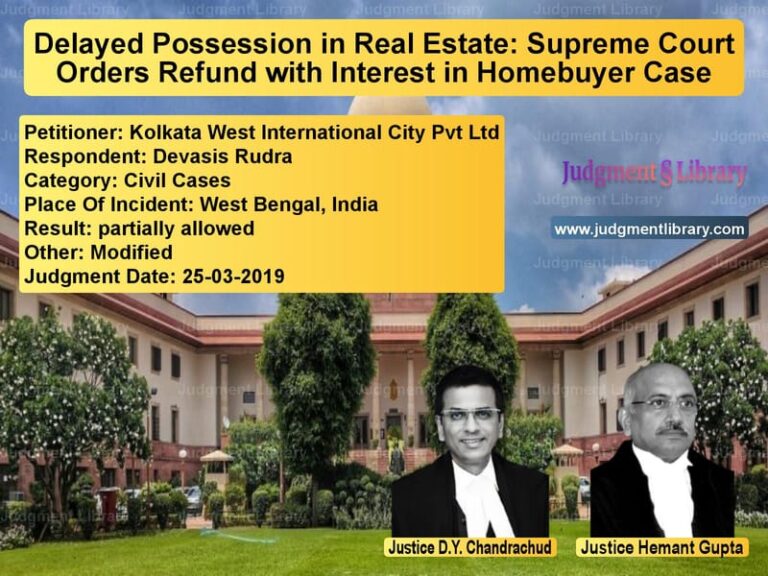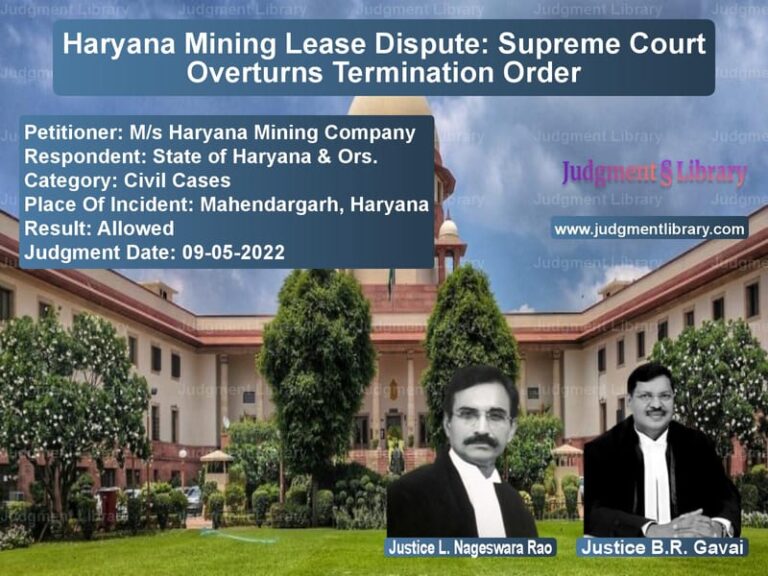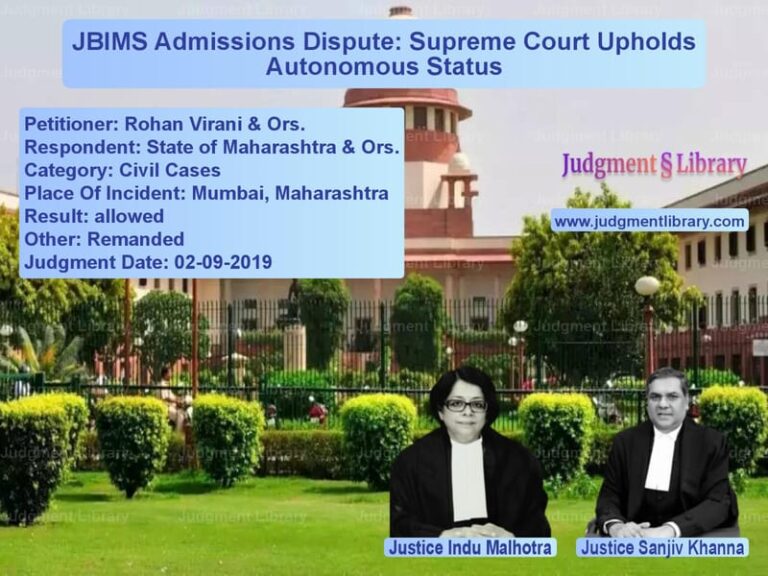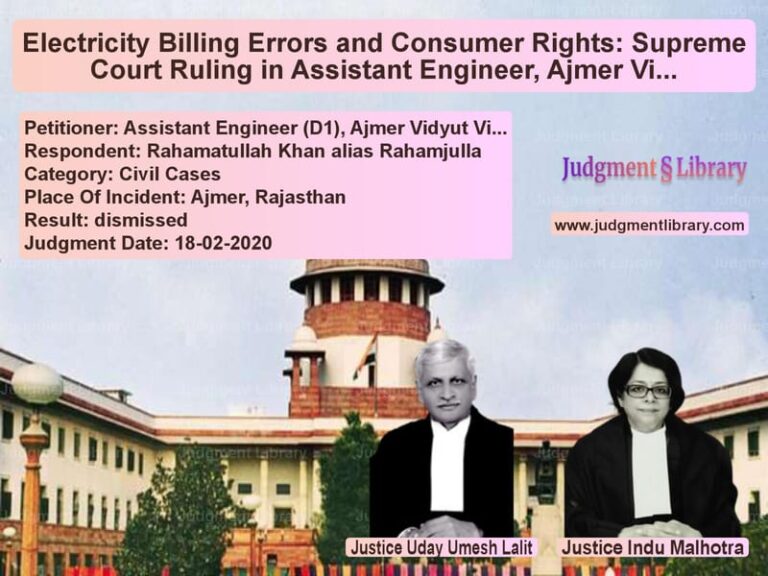Default Bail and UAPA: Supreme Court Upholds Right to Liberty
The case of Fakhrey Alam vs. State of Uttar Pradesh is a significant ruling by the Supreme Court of India that reaffirmed the constitutional right to default bail under Section 167(2) of the Criminal Procedure Code (CrPC). The case involved the prolonged detention of the accused, raising key questions about procedural fairness, the filing of supplementary charge sheets, and the jurisdiction of courts in cases under the Unlawful Activities (Prevention) Act, 1967 (UAPA).
The Supreme Court’s ruling established that default bail is a fundamental right under Article 21 of the Constitution of India and cannot be denied if the conditions under Section 167(2) CrPC are met. The Court struck down the decisions of the Chief Judicial Magistrate, Lucknow, and the Allahabad High Court, which had previously denied bail to the appellant.
Background of the Case
The case originated from an FIR No. 04/2017 registered against Fakhrey Alam under various provisions of the Indian Penal Code (IPC), Arms Act, and UAPA. The appellant was arrested on March 8, 2017, and the police were granted 180 days to file a charge sheet. However, complications arose due to delays in obtaining prosecution sanctions under the UAPA.
The timeline of key events in the case is as follows:
- March 8, 2017: The appellant was arrested.
- June 3, 2017: The Chief Judicial Magistrate granted 180 days to file the charge sheet.
- September 4, 2017: The charge sheet was filed under IPC and Arms Act but not under UAPA.
- October 3, 2017: The appellant filed an application for default bail, arguing that the charge sheet under UAPA had not been filed within 180 days.
- October 5, 2017: A second charge sheet was filed after obtaining prosecution sanction under UAPA.
- November 3, 2020: The High Court rejected the default bail plea, holding that the second charge sheet was merely supplementary.
Legal Issues Raised
1. Jurisdiction to Extend Time for Filing the Charge Sheet
The appellant contended that the Chief Judicial Magistrate, Lucknow, lacked the jurisdiction to extend the 180-day period for filing the charge sheet, as cases under UAPA fall within the jurisdiction of special courts.
2. Right to Default Bail Under Section 167(2) CrPC
The appellant argued that the charge sheet under UAPA was filed beyond the stipulated 180-day period, thus entitling him to default bail.
3. Supplementary Charge Sheet and Its Implications
The prosecution claimed that the second charge sheet was merely a supplementary charge sheet and that default bail could not be granted.
Supreme Court’s Observations
The Supreme Court analyzed the arguments and made the following key observations:
- On jurisdiction: The Court acknowledged that in the absence of notified special courts in Uttar Pradesh, the Chief Judicial Magistrate had exercised jurisdiction. However, this procedural aspect did not impact the accused’s right to bail.
- On the 180-day limit: The Court emphasized that once the statutory period had elapsed without a proper charge sheet under UAPA, the accused was entitled to default bail.
- On supplementary charge sheets: The Court held that the second charge sheet, though termed “supplementary,” was effectively a fresh charge sheet under UAPA and could not retrospectively cure the prosecution’s delay.
- On fundamental rights: The Court reiterated that the right to default bail under Section 167(2) CrPC was not merely statutory but a constitutional safeguard under Article 21.
Final Verdict
The Supreme Court allowed the appeal and granted default bail to the appellant, setting aside the decisions of the High Court and Chief Judicial Magistrate. The ruling directed that:
- The appellant be released on bail subject to conditions set by the trial court.
- The prosecution cannot bypass the statutory bail provisions by filing delayed charge sheets under the guise of supplementary charges.
- The right to default bail must be upheld in all cases where statutory time limits are breached.
Implications of the Judgment
This judgment is crucial for criminal law and constitutional rights in India. It establishes that:
- Delays in obtaining prosecution sanctions cannot justify prolonged detention.
- Default bail is a fundamental right and not subject to judicial discretion once conditions under Section 167(2) CrPC are met.
- Supplementary charge sheets cannot retrospectively validate delays in filing primary charge sheets.
- Authorities must ensure timely prosecution or release accused persons on default bail.
The ruling strengthens the principle of personal liberty and due process, preventing arbitrary detentions and ensuring compliance with procedural safeguards.
Petitioner Name: Fakhrey Alam.Respondent Name: State of Uttar Pradesh.Judgment By: Justice Sanjay Kishan Kaul, Justice R. Subhash Reddy.Place Of Incident: Uttar Pradesh.Judgment Date: 15-03-2021.
Don’t miss out on the full details! Download the complete judgment in PDF format below and gain valuable insights instantly!
Download Judgment: fakhrey-alam-vs-state-of-uttar-prade-supreme-court-of-india-judgment-dated-15-03-2021.pdf
Directly Download Judgment: Directly download this Judgment
See all petitions in Bail and Anticipatory Bail
See all petitions in Fraud and Forgery
See all petitions in Judgment by Sanjay Kishan Kaul
See all petitions in Judgment by R. Subhash Reddy
See all petitions in allowed
See all petitions in Quashed
See all petitions in supreme court of India judgments March 2021
See all petitions in 2021 judgments
See all posts in Criminal Cases Category
See all allowed petitions in Criminal Cases Category
See all Dismissed petitions in Criminal Cases Category
See all partially allowed petitions in Criminal Cases Category







